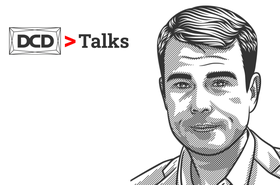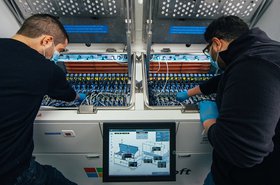In the data center world, strong supply chains ensure the survival of the facilities they serve. But despite their importance and our dependence upon them, the supply chain is an often-overlooked asset, only making it onto the radar when major problems arise, and boy have they arisen.
As if the pandemic wasn’t disruptive enough, the Russo-Ukraine war wasn’t far behind, affecting the production and lead-times of essential data center commodities such as steel for use in bus bars, steel cages and enclosures, as well as other crucial materials, including copper, tin and silicon, used in anything from microchips to server racks, to RPPs in switchgear.
Operators also have the ever-increasing price of fuel to contend with, with diesel being a particular issue for data centers. Even the price of neon gas (produced as a byproduct of making steel and used in the production of semiconductors) has shot up, due to the fact that three Ukraine-based companies – Iceblick, Ingaz and Cryoin – are responsible for 60 percent of its global production.
Despite the disruption, the data center industry did – and is still doing – a fantastic job at ensuring the show goes on. Whether through advanced planning or seeking materials from alternative sources and locations, data centers not only supported the monumental shift to remote working, but kept us connected and entertained when we weren’t able to leave our homes – after all, without data centers, there would be no Netflix.
With no control over the trajectory of global catastrophes, we are at the whim of this kind of interference. But the supply chain isn’t just about the ability to obtain materials or come up with alternative solutions, the people that make it all happen are essential.
As a supply chain-led business with a plethora of partners around the globe, who better to ask about the supply chain challenges – and solutions – currently facing the industry than CBRE? DCD sat down with Jade Sutton, procurement director for CBRE Data Centers, to pick her brain about where our focus should really lie.
Human resources
Sutton tells us that, as far as residual effects of the pandemic are concerned, day to day she is seeing very little lingering impact in her field in terms of assets. But when it comes to servicing, it’s a different story.
“In these discussions, it’s easy to forget the effects supply chains have on people as well,” says Sutton. “Issues affecting servicing at the moment are things like labor rates, and most prevalently, the so-called ‘great resignation’ catalyzed by Covid-19.
“Our IT vendors in particular are coming to us very honestly and admitting that they’re struggling to hire.”
This kind of transparency is born from CBRE’s close relationship with its supply chain partners; these relationships are held in high regard at CBRE, says Sutton. The company’s collaboration with its partners is an intrinsic part of CBRE culture, but despite these open lines of communication, an already existing skills shortage (compounded by the pandemic) is still an industry-wide point of contention.
But, why? To answer that question, we need to look at the bigger picture, and an often-overlooked part of that picture is inclusivity.
“STEM subjects at a school level often lack diversity among students, which then transfers to the professional engineering world. In my experience, the homogeneity is even greater in the data center industry, which is a cross section of both IT and engineering. It just doesn’t seem like the most accessible market for those who feel they won’t fit in culturally.”
Sutton goes on to explain that she didn’t need extensive industry tenure or an IT degree for her particular role, but that this preconceived mold could still be discouraging to people who aren’t already in this field .
Combatting the status quo
“At CBRE, our internal inclusivity targets are robust, and we have many networks and support groups, like the Women’s Network, to create a sense of community and provide resources across all demographics.
“I’m now starting to see a bit of a cultural shift, which is why I’ve been at CBRE for so long and why I intend to stay. It’s not just lip service, there is genuinely a greater respect for those who break that barrier.”
And due to the cross section within the data center industry, Sutton tells us that although it’s been a slower start compared to CBRE’s standard facilities management business, in the time she’s been with the company, the acknowledgment and internal changes have been established very quickly. The company is now around 30-40 percent women, which, for the data center industry is incredible progress, given that the current industry average sits at around 10 percent.
Sutton also considers graduates to be an invaluable and underutilized resource when it comes to plugging the skills gap. SMEs often overlook graduates as they are considered to be too inexperienced to work in critical environments. But CBRE sees the value this group can bring and provides opportunities for career growth.
“We have a fantastic graduate programme at CBRE that is building year on year, which I think is amazing. We have highly skilled people coming out into a working world with very little opportunity. If you can offer these people free training in a field they know is going to be there for a long time, like data centers and green initiatives, you’ve got a very easy market to pick the best of the best at very reasonable rates for salary and training.
“Young talent are willing to give everything to the role, and you really can make them into that next level engineer or next level area manager. It’s definitely a missed opportunity.”
A cyclical problem
So, we’ve established that inclusivity is good, as is fresh talent, and it’s encouraging to see companies with the scale CBRE has actioning the kind of change we want to see. Ultimately, the more people we have entering the industry, the wider and more diverse the talent pool will be. But how are recruitment issues affecting the supply chain?
“In terms of assets, there are very specific needs that only data centers have, but these specific assets come with a specific skill set that you can’t transfer from a general site to somewhere else,” says Sutton.
She adds that the Russo-Ukraine war has added a certain specificity to the issue, in that our reliance on increasingly expensive fossil fuels is spurring the need for alternatives, and the industry is looking even more towards renewables.
It’s all very well saying ‘by 2030 we will reach net-zero’ or ‘by 2050 we’ll be green’ and other lofty commitments that convey sustainable intentions, Sutton says, but what CBRE is seeing now, is a genuine desire for progress, which many companies are ill-equipped to deliver.
“Clients are now asking, ‘How quickly can we switch to renewables?’ ‘How quickly can we have an energy reduction plan?’ which is great. But then what we’re seeing is, ‘Oh, hang on, do we have enough energy specialists or enough green specialists to not just greenwash this?”
Clients need people on board who know exactly what they’re talking about and can deliver actionable change very quickly, and at the moment, they simply don’t have the staff.
“It circles back to the workforce, and a lack of skilled labor. These kinds of roles are quite new to the market and having a sustainability officer and energy managers is relatively novel. When you combine that with the data center knowledge needed to do those jobs well, that’s when we see challenges arise.”
Overall, the industry at large needs to realize that a lot of the barriers to a successful supply chain come back to this lack of skilled labor.
“It all comes down to pre-planning for what you need, with people, and the rest will come. We can talk about pre-buying goods and components, but we still need people to understand where is best to pre-buy and from whom, and how to plan and action those elements so you don’t over buy. This is all very new to a lot of people,” says Sutton.
Stay in your lane
It’s safe to say that in terms of change, the data center industry moves at speed, which has pros and cons. SMEs essentially need to build the plane while flying it, and it can be easy to get caught up in the chaos. To avoid flying blind, the key is to know your limits and play to your strengths, says Sutton.
“I’m seeing issues with a lot of SMEs trying to be everything at once and they simply cannot, especially with their size and financial constraints. They need to be taking pause to understand the needs of the bigger fish and pick a lane they can really focus on.”
For example, HVAC vendors have been significantly affected by recent supply chain challenges. So as long as it’s safe, should they go for the cheapest option, even if it’s not green, in order to maintain data center operations? Or instead, should a specialist come in and switch everything to backdoor cooling to save on water use?
“Pick a lane, identify your own unique selling point, and market yourself as that. Only then should you begin to diversify on your own sacred ground,” advises Sutton.
A declaration of trust
The transparency and trust CBRE has with its clients and partners is a major differentiator. Customers can be reluctant to use unfamiliar suppliers because they fear being too honest about the challenges they’re facing could be leveraged against them.
As a result, customers end up withholding information, or approaching orders at the very last minute. “To avoid all that, the trust has to be there to begin with,” says Sutton. “You need to be able to have frank conversations, ‘Where are you now, where do you want to be in six months, 12-months. What are your clients saying?”
“If our clients trust us with that information, we can then create the optimum solution that will reduce lead times, potential risks and improve output. If we have as much information as possible up front, early on, all these issues are greatly reduced.”
And when it comes to mitigating supply chain risks, knowledge is power, whether it be via the personnel you employ, or knowing your vendors inside out. And as a customer, if you don’t know everything, having a trusted partner you can rely on and collaborate with means you don’t have to.
“A client might want to get greener as quickly as possible, they might have aging kit, or maybe they have new customers pressuring them for these previous nice to haves. CBRE can help them action their needs very quickly thanks to our internal people and our vendor partnerships.
“Clients don’t need to come to us saying, ‘This is what we need’. We can be involved long before that. We can act as a consultant to help them do it, more quickly, more efficiently, and at a more competitive price. We don’t work in silos, and we can leverage our size, flexibility, and agility to formulate the best way forward with the best partners.”
Overall, supply chains shouldn’t be seen as ‘the other’, nor should they be viewed exclusively in terms of material commodities. Investment in people is one of the most proactive steps you can take toward securing the solid supply chain needed to carry your business not only now, but into the future.
You can learn more about how CBRE supports data center and supply chain operations here.
More from CBRE
-

Sponsored Sustainability: The bigger picture
Taking a holistic approach to sustainability in the data center
-

DCD>Talks Management & Operations with Colin Delacy, CBRE
Dive into management & operations with this DCD>Talk from our live DCD>Connect Silicon Valley event
-

Why mission-critical tech innovation is important to CBRE
And they decided to sponsor the DCD award
